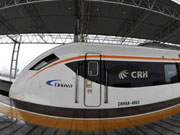TAIPEI, Feb. 27 -- Negotiators from the Chinese mainland and Taiwan on Thursday signed two agreements on meteorological and seismic cooperation, promising information exchanges and joint monitors between the two regions that are both seismically active and prone to typhoons.
Chen Deming, president of the mainland-based Association for Relations Across the Taiwan Straits (ARATS), and Lin Join-sane, chairman of the Taiwan-based Straits Exchange Foundation (SEF), signed the pacts in Taiwan's Taipei City.
Thursday's ARATS-SEF talks, the 10th round since 2008, aimed to facilitate cooperation in order to raise early warning capacity and protect people's lives and properties in the face of meteorological disasters and earthquakes.
In the seismic pact, the two sides agreed on earthquake monitoring and technology, publicity and education on disaster prevention, and personnel exchanges.
The meteorological pact agrees to cooperate in meteorological operations and technology, including information sharing, research and monitoring typhoons, rainstorms and other weather phenomena.
CLOSELY LINKED
In a speech on Thursday morning, Chen said the mainland and Taiwan should establish a close cooperation mechanism, as both sides are prone to meteorological and seismic disasters.
Taiwan is located in a seismically active zone on the Pacific Ring of Fire, while the mainland also sits on several earthquake belts. Both are also subject to typhoons, with last year's Usagi forcing evacuations in Taiwan and leaving 30 people dead in Guangdong Province on the mainland.
"To our delight, the two sides' meteorological and seismic authorities, having taken into mind the people's well-being and the safety of lives and property, have reached consensus on the contents of the agreement with great efficiency," Chen said.
Shin Tzay-chyn, chief of Taiwan's meteorological authority, stressed the importance of the cooperation, saying the weather systems of the mainland and Taiwan are closely linked, just like the upstream and downstream of a river.
In summer, typhoons often brush past Taiwan before landing on the "downstream" of the mainland, while the cold snaps in winter sweep through north and central parts of China to reach Taiwan, making the island the "downstream," he said.
Chen Wen-shan, a Taiwan-based geologist, said the seismic pact will help better monitor the undersea earthquakes in the Taiwan Strait or the East China Sea.
"Accurate measuring of deep-sea quakes requires more than one monitoring spot near the epicenter. It's hard to ensure accuracy by just monitoring on one side of the strait," Chen said.
MORE ECONOMIC PACTS EXPECTED
The agenda of the next round of talks was also released on Thursday.
The two sides have agreed to push forward two agreements on commodity trade and trade dispute settlements and work to make sure they are signed before the end of the year, according to Zheng Lizhong, ARATS executive vice president.
The next talks will also include avoidance of double taxation, setting up of cross-Strait offices by the ARATS and SEF, cooperation in civil aviation and aircraft airworthiness, and environmental protection.
Zheng said the pact on scrapping double taxation, which would in particular benefit Taiwanese doing business in the mainland, was put into the agenda after five years of arduous negotiation.
"The two economies across the Strait belong to that of the Chinese nation. We will try our best to meet the needs of Taiwanese compatriots and bring real benefits to the Taiwanese public," he said.
The senior diplomat also urged the ratification of the service trade pact, saying Taiwan's industries and ordinary people would be the biggest victim of any delays.
The pact will open up the mainland's vast service market to Taiwan, as the mainland is upgrading its economic model and promoting domestic demands, he said, encouraging people in Taiwan to grasp the opportunities.
A follow-up agreement to the cornerstone Economic Cooperation Framework Agreement, the service trade pact was signed in June but was still pending ratification by the island's legislature.
On Thursday, Chen Deming also met with Wang Yu-chi, Taiwan's mainland affairs chief.
Chen said the ARATS and SEF will continue to exchange ideas on future cooperation in fields such as education, technology, agriculture and fishery.
He added that the mainland values and always listens to the will and calls from Taiwan compatriots and makes them the start-point when working out various policies.
 |

 Top 10 most handsome faces in Asia in 2013
Top 10 most handsome faces in Asia in 2013 Top 10 Chinese youth's favorite seaside resorts
Top 10 Chinese youth's favorite seaside resorts Female celebs with beautiful long legs
Female celebs with beautiful long legs Heavy snow sweeps many parts of China
Heavy snow sweeps many parts of China Top 15 most beautiful female athletes in Sochi
Top 15 most beautiful female athletes in Sochi Intercity high speed train in operation for the first time
Intercity high speed train in operation for the first time Beauties competing at Sochi Winter Olympics
Beauties competing at Sochi Winter Olympics PLA to attend Cobra Gold 2014 military exercise
PLA to attend Cobra Gold 2014 military exercise Sydney celebrates Chinese New Year with Twilight Parade
Sydney celebrates Chinese New Year with Twilight Parade Brave mother fights cancer, enjoys Spring Festival with her triplets
Brave mother fights cancer, enjoys Spring Festival with her triplets Highlights of Chinese New Year celebrations around the world
Highlights of Chinese New Year celebrations around the world  Top 20 most beautiful Chinese stars
Top 20 most beautiful Chinese stars  Sanya bans skinny dipping in public beach
Sanya bans skinny dipping in public beach
Day|Week|Month